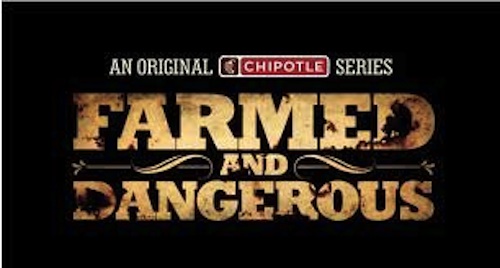The series rolls out on Hulu on February 17. But wait, why would a burrito company make an Internet/app TV show? Doesn’t that seem weird? Not entirely. First of all, there’s no product placement in the episodes of the show that will roll out (although a central character is named “Chip,” which is kind of dumb and awkward), and there’s no real association on the show with the Chipotle brand — except for the fact that the show was conceived out of their marketing department. Here’s some of the logic:
The commitment to more sustainable farming via advertising not only associates the company with more savory (and PR-friendly!) practices, but could also lead to sales in the long term, as Chipotle’s chief marketing officer Mark Crumpacker explained toFast Company. “As people come to be more interested in where their food comes from, they will seek out better quality food,” he said. Unlike competitors, much of Chipotle’s supply includes antibiotic-free meat and local vegetables. The television show, in theory, will subtly convince consumers to choose Chipotle over, say, McDonald’s.
You may remember Chipotle has done things like this before, including The Scarecrow ad:
And the Coldplay/Willie Nelson ad:
Chipotle has a strong brand overall — it isn’t actually owned by McDonald’s, despite rumors from every fourth friend you’ve ever had — although not all their ingredients are GMO-free and their definition of locally-sourced food is ‘traveled 350 miles or less to its destination,’ which is roughly the distance from New York City to Richmond, VA.
If you go ‘behind-the-scenes’ on the Farmed and Dangerous website, you’ll see that it’s all tied to their Food with Integrity mission/theme.
So back to the main question: how awkward is this? On surface, it feels a bit awkward, to be sure — but you need to realize that television has been supported by advertisers basically since its inception. In that way, creating an original series and putting it on Hulu is equivalent to doing a big product placement stunt or a promotional event. It’s just a different way of marketing, and with more channels/platforms out there looking for content, the match can be made easier (well, comparatively easier than 10-15 years ago). It’s an interesting marketing move, and it could go well — people love the show, and feelings extend to the brand (or, at the very least, people start thinking they don’t want industrially-farmed food and that attitude extends to the brand) — or it could go poorly. In that case, people hate the show, realize it’s contextually connected to Chipotle, and start thinking about other quick-food options as a ding to the brand.
Here’s what Justin Wilkes, the president of Radical Media, had to say on just that topic:
The danger, he says, is if people invest time and hate it. Unlike with a bad television show from a traditional media company, dissatisfied viewers will take it out on the brand. “If an advertiser puts a lot of muscle behind something and puts it out there and it’s a failure, they’re going to get slapped that much harder for it.”
It’ll be interesting to see how this plays out. Could it represent the future of TV, where advertisers just spend money on original content dedicated to advancing their brand’s agenda without their brand’s face? Potentially. That might be a ways off — I think we still have more years of straight-up product placement on Modern Family to endure first — but it could be a tide-shifting situation for marketing departments if this does well.
